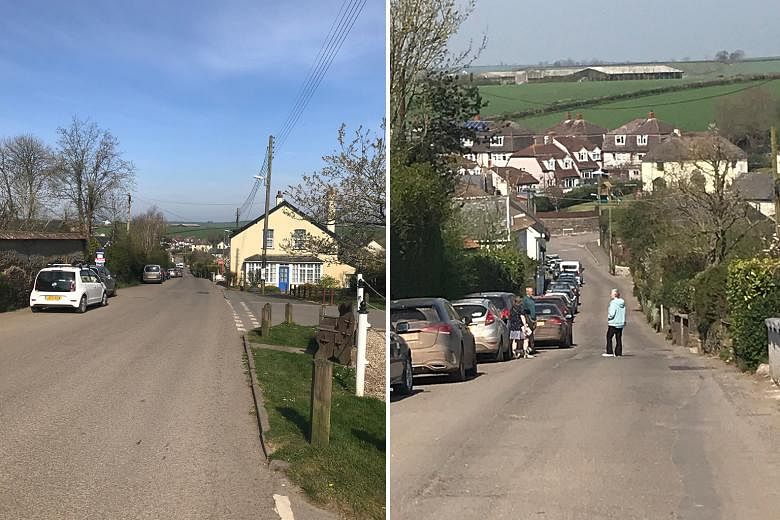Much has been said about Britain's relaxed attitudes towards Covid-19, the disease caused by the coronavirus officially labelled the Sars-CoV-2 virus. But over the course of a few short weeks, everything has changed, particularly in the heart of rural Britain.
I moved to England last year and just before Christmas, settled into a little village in Devon, with a population roughly the same as the Braddell View estate where I lived in Singapore. This is beautiful, rolling, dairy countryside but I was too distracted to enjoy it.
In January, news emerged of a Sars-like pneumonia in China, and I started to worry about what that might mean for my parents in Singapore. Like many Singaporeans who lived through the Sars scare, I vividly remember how quickly it spread.
Here in Devon, the coronavirus was just not a topic of conversation and, for me, there was a huge mental disconnect.
In February, birthday parties were still being held. When I tried to explain to my new driving instructor that I was not a Covid-19 risk, having entered England before the virus emerged, he laughed and dismissed it as a mild flu.
Last month, when I went to the hairdresser's in town and declared myself a non-coronavirus risk, thinking it would be helpful in contact tracing, I succeeded only in embarrassing the poor woman.
In the nearest city of Exeter, I saw only a handful of people wearing masks; and they all looked Chinese.
Up until the three-week shutdown declared on March 23, neither the village primary school nor pre-school was checking children's temperatures in the morning or sanitising their hands before entry.
But once the shutdown was declared, everything changed.
Overnight, everyone in my village started to conscientiously mind the 2m social distancing gap. People crossed the road to avoid oncomers and called out hellos to each other instead. The village shop proprietors took all orders at the door, separated from customers by a 1.5m table. Payment was only by card, waved at the machine through the windowpane. Milk bottles to be returned must first be doused in a bucket of diluted bleach, helpfully provided. People still chatted in the queue - but while 2m apart.
Across the countryside, attitudes hardened, and city dwellers hoping to spend the shutdown in their idyllic country second homes were not finding a friendly welcome.
National Trust carparks were closed to discourage walkers and maintain social distancing. Many public footpaths are ancient, and give the public a right of way over fields and farmland that belong to other people, sometimes skirting someone else's garden.
My husband took our children out on a walk along just such a public footpath the other day, two minutes from our cottage. As soon as they were past the public gatepost, a dog bounded up, followed by its owner who asked them not to touch the dog and if they planned to return that way. It was obvious she would be more comfortable if they did not. Then, she disinfected the gatepost.
Now, we choose walks that, as much as possible, keep away from people's houses, as much for keeping the peace as anything else. Yet, for all the rigorous care taken over social distancing - or perhaps because of it - not a single person is wearing a mask here.
My husband is the only weak link; he has to go to town once a week to shop for essentials. Supermarkets, failing to cope with the surge in demand for home deliveries, have urged customers to leave online shopping to the vulnerable and self-isolating. Due to shortages (in flour, rice, etc), he is sometimes forced to enter more than one supermarket. But as soon as he returns, he washes his hands and does the necessary.
Yet being part of a small community has its advantages. Our village pub - the traditional heart of rural England - which closed before the shutdown because its elderly proprietor was recuperating after having been in hospital, is offering takeaways and deliveries, including pints of beer.
To help the elderly and vulnerable stay home, the parish council quickly mobilised an army of volunteers to help pick up medical prescriptions, shop for groceries or even offer a friendly chat on the phone. Even though our household fits neither description, we received a friendly phone call, simply because we were new to the village, with offers of help and useful local information.
Since the shutdown, neither I nor my children have come within 2m of anyone other than a family member. This should feel isolating but instead, it feels really nice that everyone in our community is making a real effort to keep it safe and, crucially, that we are lucky enough to have the space to do it.

